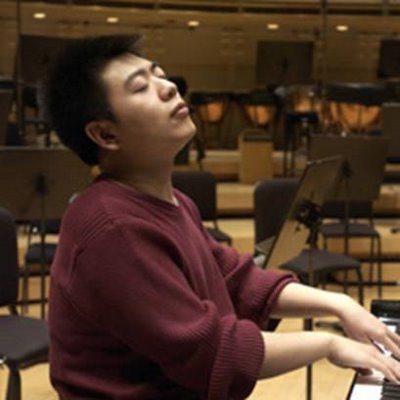Lang Lang's Trip down Memory Lane
| Available at Amazon: Lang Lang, Memory (released on March 14, 2006) |
If we forget the lamentable way that DG has packaged Lang Lang for the past three years ("the next Horowitz" are three words that should never be combined in a press release), we can focus on just what an incredible technical talent Lang Lang is. His playing on the Tchaikovsky/Mendelssohn concerto disc he made with Daniel Barenboim and the Chicago Symphony often blew my mind, although the concerti as whole entities were not quite successes. Facility he has in innumerable quantities, although he often falls short on intelligence and subtlety. Memory is essentially the same program that Jens heard Lang Lang play at the Kennedy Center last spring. He was apparently touring with the program in preparation for the recording sessions in Germany that summer. Judging from what Jens wrote, if you buy this CD, you will get essentially what you could have heard in the live recital, a lot of technically impressive playing, musically sensitive but not life-altering.
George A. Pieler, Lang Lang Takes Off to Liszt (recital at Strathmore, April 15, 2006) Robert R. Reilly, Lured by Walton, Charmed by Chopin (Chopin's first concerto with NSO, December 2, 2005) Jens F. Laurson, Form Over Matter? Lang Lang at the Kennedy Center (recital at Kennedy Center, April 4, 2005) Jens F. Laurson, Lang Lang & Gergiev in Rachmaninov (Rachmaninov concerto CD, February 10, 2005) |
It was K. 330, in fact, that made the nine-year-old Lang Lang realize, following a deeply discouraging experience with his teacher, "how much I loved playing the piano. From that point on, this Mozart piece had special significance for me because it brought me hope again."Under such sentimental weight, the sonata is bound to lose its musical identity. Perhaps Lang Lang should consider approaching Mozart as a quirky virtuoso, which is exactly what he (Lang Lang) is.
 There is a certain amount of foggy reminiscence inherent to many of the works of Chopin, which one could argue would make the composer's third sonata (B minor) a better choice for this program about remembering. A similar sense of constriction appears to reign here, however, which hamstrings the excess of Chopin's score. The only shocking moments are the molto vivace sections at the opening and close of the second movement scherzo, played at a breakneck tempo, in which I can barely perceive a regular beat. However, slow sections -- for example, long stretches of the third-movement Largo -- are dull and colorless, sapped of energy by lack of rhythmic impetus.
There is a certain amount of foggy reminiscence inherent to many of the works of Chopin, which one could argue would make the composer's third sonata (B minor) a better choice for this program about remembering. A similar sense of constriction appears to reign here, however, which hamstrings the excess of Chopin's score. The only shocking moments are the molto vivace sections at the opening and close of the second movement scherzo, played at a breakneck tempo, in which I can barely perceive a regular beat. However, slow sections -- for example, long stretches of the third-movement Largo -- are dull and colorless, sapped of energy by lack of rhythmic impetus.Lang Lang treasures Schumann's Kinderszenen, op. 15, and with good reason. The work comprises some of the most charming miniatures ever composed, some of them fiendishly difficult and far from child's play. Here, at least, a certain schmaltzy nostalgia is perfectly appropriate, and Lang Lang's playful approach suits many of the pieces quite well. For example, Hasche-Mann (Catch me if you can) is 28 seconds of breathless agitation. Träumerei (Dreaming), which Lang Lang often plays as an encore (on the Live at Carnegie Hall recital disk, for example), is the longest piece in the collection, is a muted rêverie. It's the best performance here other than the encore.
For the encore, there is a bonus CD containing the nine wild minutes of Vladimir Horowitz's amped-up arrangement of Franz Liszt's second Hungarian rhapsody, in C# minor. This might seem like hubris, attempting to out-Liszt Liszt, but Horowitz's version is a thrilling whirlwind of sound. Lang Lang's performance is not flawless, but along with Marc-André Hamelin's recording of the Hawthorne movement of Ives's Concord Sonata, it contains some of the most unbridled, crazed playing I have ever heard from a pianist. In my opinion, this is Lang Lang's natural territory at this point in his career, Liszt and all of the most technically challenging repertoire composed for the piano -- the big Prokofiev sonatas, Stravinsky's Petruchka Suite, and even perhaps the Concord Sonata. May I also suggest a complete recording of the Études d'exécution transcendante as a future project? I think Lang Lang may be the one to attempt the Douze Grandes Etudes version (the second of three, published in 1839) that Liszt made of these astoundingly difficult pieces, usually described as unplayable. I am sure that Lang Lang's performance of "Feux Follets" (no. 5) would be something to hear.
Lang Lang's next performance in Washington is on Saturday, May 20. He will play as part of the WPAS Annual Gala and Auction at the Ronald Reagan Building and International Trade Center.





















































No comments:
Post a Comment